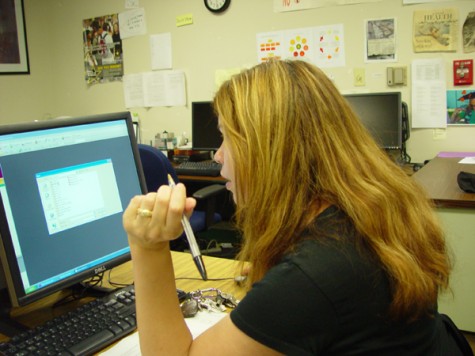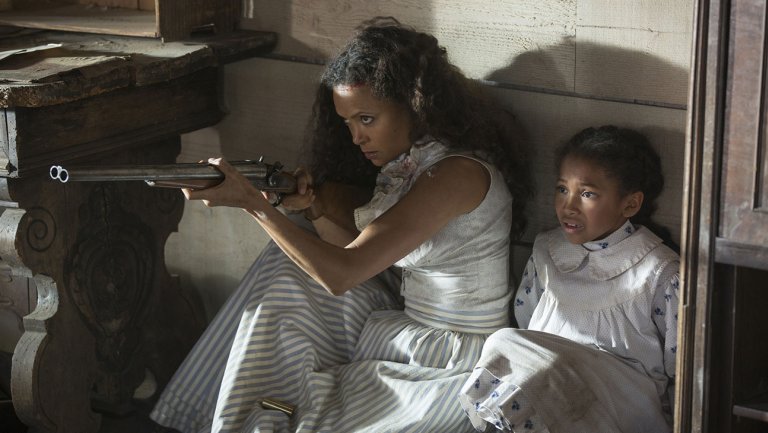What Makes Us Human?
HBO’s new series questions the nature of consciousness
GO WEST: Brothel keeper Maeve Milay (Thandie Newton) has a tragic history as settler who unsuccessfully defended her daughter (played by Jasmyn Rae) from a violent Indian attack. Westworld questions whether a synthesized memory can be experientially real.
In a world of first-person shooter video games that will soon be augmented with virtual reality helmets, it is easy to imagine the next step: an amusement park where players can enact their fantasies as a full-immersion experience.
This is the premise of “Westworld,” HBO’s newest big-budget serialized drama. Wealthy “guests” travel back to the heady days of the western frontier where they are welcomed by a wide variety of archetypical characters known as “hosts” who draw them into various storylines. Adding to the realism of the park environment, the hosts are blissfully unaware that they are in any way different from the guests, and interact with them as fellow human beings.
Of course there is a critical difference — the hosts are objects who have no more reality than a digital prostitute in “Grand Theft Auto.” Guests may choose to wear white hats or black hats, signifying a general tendency towards heroic or villainous traits and use the hosts as they will, which in the consequence-free environment tends to sex and murder. After each round of play the dead and damaged hosts, which are extraordinarily sophisticated androids, are gathered up for cleaning and repair, and most importantly, to have their memories erased.
“Westworld” is loosely based on the 1973 film of the same name, written and directed Michael Crichton who went on to write “Jurassic Park.” Its present incarnation owes more to husband-wife creators Jonathan Nolan and Lisa Joy, whose multi-level storylines and dialogue are mesmerizing.
HBO is literally banking on the success of this show, which many consider to be a successor to “Game of Thrones.” The pilot episode cost $25 million, the first season is estimated at $100 million. It’s star actors include Anthony Hopkins as park founder Dr. Robert Ford, Ed Harris as The Man in Black, Evan Rachel Wood as Dolores Abernathy, a plucky girl-next-door host, Jeffrey Wright as Ford’s assistant Bernard Lowe, Jimmi Simpson as a first-time guest, and in a particularly riveting performance, Thandie Newton as level-headed madam Maeve Millay.
According to Forbes, the investment has paid off: “Westworld” attracted 12 million weekly viewers on average, which gave it the most viewers of any original HBO series’ first season.
After Ford programs the robots to experience a sort of “reverie” or period of reflection to give them an enhanced “realness,” glitches start occurring among the robots. Sometimes this manifests in overloading the circuits, sometimes in unpredictable behavior. Tensions in the park management become strained. Ford and Lowe, as scientists, have their own agenda to push the limits of what is possible with artificial life. The guests have the expectation of limitless entertainment, and the park stockholders want Westworld to be as profitable as possible. Amid all of this, it seems that the androids are becoming sentient.
Hosts fulfill a number of functions, but the main imperative is that the guests are kept safe. Guests may kill hosts but not each other, and a pre-programmed “good Samaritan” reflex causes the hosts to protect the guests from harm, whether that comes from hosts, other guests or from themselves. The recklessness of saloon fights, shoot-outs, buffalo stampedes and wild desperados is mitigated by the reality that humans can’t be seriously injured.
Reminiscent of the studies of social-psychologist Paul Piff, which demonstrate that winners in a rigged game of Monopoly are quick to forget their privilege and give themselves credit for unearned achievements, the guests begin to forget any social constraints that they felt in the outside world.
Into this venue of frontier lawlessness, guests are encouraged to discover their “true selves” and in practice that seems to mean that in a consequence-free environment, it doesn’t take long for “civilized” people to go completely “Lord of the Flies” on the hosts. The most sadistic of them all being The Man in Black, a mysterious guest played by Ed Harris, who claims that he has visited Westworld since it opened 30 years before, and seems to be following a storyline of his own invention.
As for the hosts, the hyper-realism aspired to by Ford and Lowe causes tension with the Delos Corporation and with the lead storyline editor who find that the expense, the glitchiness and the maintenance aren’t worth the trade-off. The storyline editor Lee Sizemore (played by Simon Quarterman) makes a convincing argument that guests do not want to play with realistic game pieces — that making them more human detracts from the enjoyment of the consequence-free experience. Nevertheless, independently of one another the androids are becoming “woke.” They connect with their traumatic anchor point, a synthetic memory that is experienced as real, and when combined with memory begins to create a consciousness, leaving viewers wondering what it really means to be human.
“Westworld” is available on HBO/HBO GO
5/5 Stars
★★★★★

Jane Pojawa is a Southern California-based print media editor/writer who also dabbles in web design. Her passion is historical research and has served...

